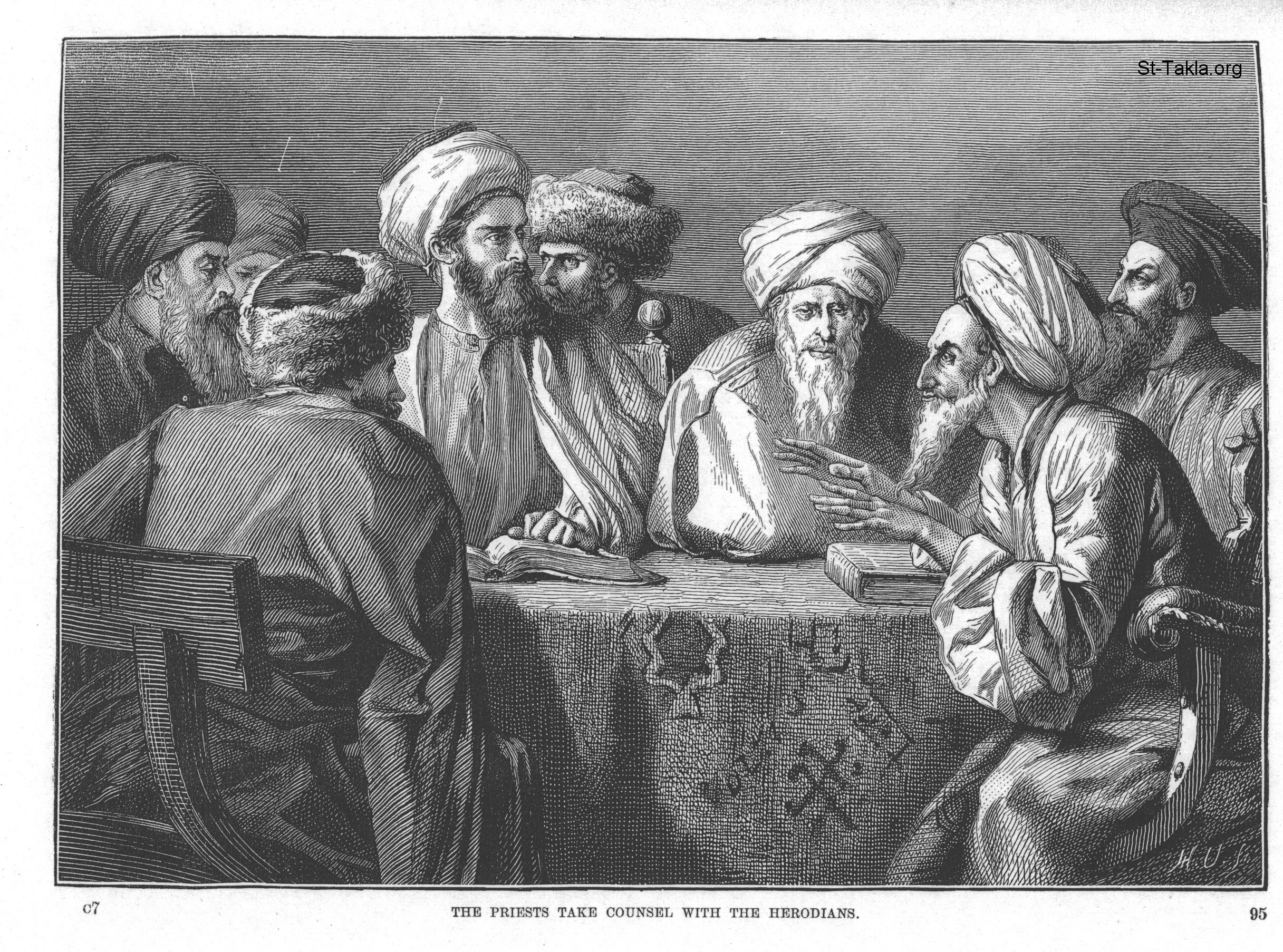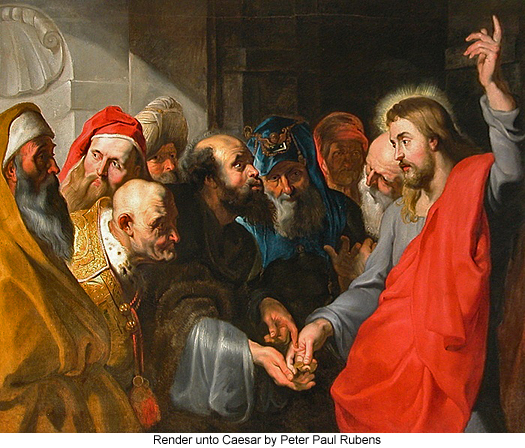Mat 22:15 Then the Pharisees went and consulted together how they might entrap Him in His conversation.
Mat 22:16 So they sent to Him their disciples together with the Herodians; who said, "Teacher, we know that you are truthful and that you faithfully teach God's truth; and that no fear of man misleads you, for you are not biased by men's wealth or rank.
Mat 22:17 Give us your judgement therefore: is it allowable for us to pay a poll-tax to Caesar, or not?"
Mat 22:18 Perceiving their wickedness, Jesus replied, "Why are you hypocrites trying to ensnare me?
Mat 22:19 Show me the tribute coin." And they brought Him a shilling.
Mat 22:20 "Whose likeness and inscription," He asked, "is this?"
Mat 22:21 "Caesar's," they replied. "Pay therefore," He rejoined, "what is Caesar's to Caesar; and what is God's to God."
Mat 22:22 They heard this, and were astonished; then left Him, and went their way.
Introduction
After telling the crowd the Parable of the Wedding Feast and what happens to those who refused to come when invited, the hypocrites send their disciples to Jesus try to trap Him in what He said. The All-knowing Messiah has the answer for the subtle sneaky questions of the opposition about paying taxes to Caesar.
Notes
Then went the Pharisees. The main element, no doubt, in the deputation which had assailed Him.
They tried to ensnare him in speech. This mode of attack was adopted in view of the complete failure of the last attempt, and was the most artful of all.
Mat 22:15 Then the Pharisees went and consulted together how they might entrap Him in His conversation.

Mat 22:16 So they sent to Him their disciples together with the Herodians; who said, "Teacher, we know that you are truthful and that you faithfully teach God's truth; and that no fear of man misleads you, for you are not biased by men's wealth or rank.
Notes
The disciples of the Pharisees : These young men were being schooled in the ways of the religious sect which was the strictest in Judaism.
The Pharisees (/ˈfærəˌsiːz/) were at various times a political party, a social movement, and a school of thought in the Holy Landduring the time of Second Temple Judaism. After the destruction of the Second Temple in 70 CE, Pharisaic beliefs became the foundational, liturgical and ritualistic basis for Rabbinic Judaism (the term 'Judaism' today almost always refers to Rabbinic Judaism).
Conflicts between Pharisees and Sadducees took place in the context of much broader and longstanding social and religious conflicts among Jews, dating back to the time of slavery in Egypt and exacerbated by the Roman conquest.[1] Another conflict was cultural, between those who favored Hellenization (the Sadducees) and those who resisted it (the Pharisees). A third was juridico-religious, between those who emphasized the importance of the Second Temple with its rites and services, and those who emphasized the importance of other Mosaic Laws. A fourth point of conflict, specifically religious, involved different interpretations of the Torah and how to apply it to current Jewish life, with Sadducees recognizing only the Written Torah (with Greek philosophy) and rejecting doctrines such as the Oral Torah, the Prophets, the Writings, and the resurrection of the deadhttps://en.wikipedia.org/wiki/Resurrection_of_the_dead
The Herodians derived their name as followers of King Herod. The Herodians were a political party that wanted to restore a Herod to the throne in Judea as well ...
a Jewish political party who sympathized with ( Mark 3:6 ; 12:13 ; Matt, 22:16 ; Luke 20:20 ) the Herodian rulers in their general policy of government, and in the social customs which they introduced from Rome. They were at one with the Sadducees in holding the duty of submission to Rome, and of supporting the Herods on the throne. (Compare Mark 8:15 ; Matthew 16:6 .) Easton's Bible Dictionary.
Their flattery :"Teacher, we know that you are truthful and that you faithfully teach God's truth; and that no fear of man misleads you, for you are not biased by men's wealth or rank.
We know that thou art true - A hypocritical compliment, not believed by them, but artfully said, as compliments often are, to conceal their true design. Barnes
that you faithfully teach God's truth; That is, thou art an independent teacher, delivering your sentiments without regard to the fear or favor of man. This was true, and probably they believed this. Whatever else they might believe about him, they had no reason to doubt that he delivered his sentiments openly and freely.Barnes
Mat 22:17 Give us your judgement therefore: is it allowable for us to pay a poll-tax to Caesar, or not?"
Notes
Give us your judgement therefore : Tell us what you think about this….
Is it lawful to pay taxes to Caesar or not?"
Tribute was the tax paid to the Roman government.
Caesar - The Roman emperor.
The name Caesar, after the time of Julius Caesar, became common to all the emperors, as Pharaoh was the common name of all the kings of Egypt. The “Caesar” who reigned at this time was Tiberius - a man distinguished for the grossest vices and most disgusting and debasing sensuality.Barnes Notes
Mat 22:18 Perceiving their wickedness, Jesus replied, "Why are you hypocrites trying to ensnare me?
Notes
Perceiving their wickedness, Jesus replied,
Luke says, "their craftiness"; and Mark says, "knowing their hypocrisy"; for there was, a mixture of malice, hypocrisy, and artfulness, in the scheme they had formed; but Christ being the omniscient God, saw the wickedness of their hearts, knew their hypocritical designs, and was well acquainted with all their art… J. Gill
Jesus replied, "Why are you hypocrites trying to ensnare me?
ensnare : How they might entangle him - To entangle means to “ensnare,” as birds are taken by a net. This is done secretly, by leading them within the compass of the net and then suddenly springing it over them. So to entangle is artfully to lay a plan for enticing; to beguile by proposing a question, and by leading, if possible, to an incautious answer. This was what the Pharisees and Herodians endeavored to do in regard to Jesus.
Mat 22:19 Show me the tribute coin." And they brought Him a penny...
Notes
A denarius: probably the ordinary capitation tax, though the poll tax in the law, Exo_30:13, Exo_30:14, was half a shekel, about twice as much as the denarius. The Roman denarius had the emperor’s image with a proper legend stamped on one side of it. It was not therefore the sacred shekel which was to be paid for the repairs of the temple which was now demanded, but the regular tribute required by the Roman government.A.Clark
Mat 22:20 "Whose likeness and inscription," He asked, "is this?"
Notes
Whose is this image and superscription? - He knew well enough whose they were; but he showed the excellency of his wisdom, 3dly, in making them answer to their own confusion. They came to ensnare our Lord in his discourse, and now they are ensnared in their own. He who digs a pit for his neighbor ordinarily falls into it himself.A.C.
Mat 22:21 "Caesar's," they replied. "Pay therefore," He rejoined, "what is Caesar's to Caesar; and what is God's to God."
Notes
They say unto him, Caesars - The image was the head of the emperor; the superscription, his titles. Julius Caesar was the first who caused his image to be struck on the Roman coin. Tiberius was emperor at this time.
Render therefore unto Caesar - The conclusion is drawn from their own premises. You acknowledge this to be Caesar’s coin; this coin is current, in your land; the currency of this coin shows the country to be under the Roman government; and your acknowledgment that it is Caesar’s proves you have submitted. Don’t therefore be unjust; but render to Caesar the things which you acknowledge to be his; at the same time, be not impious, but render unto God the thing’s which belong to God.
Mat 22:22 They heard this, and were astonished; then left Him, and went their way.
Notes
astonished G2296 θαυμάζω thaumazō
Thayer Definition: 1) to wonder, wonder at, marvel 2) to be wondered at, to be had in admiration
Part of Speech: verb
they marvelled - And well they might - never man spake like this man. By this decision, Caesar is satisfied - he gets his own to the uttermost farthing. God is glorified - his honor is in every respect secured. And the People are edified - one of the most difficult questions that could possibly come before them is answered in such a way as to relieve their consciences, and direct their conduct.A.C.
Application
Are you a tax dodger? Have you paid your proper taxes to the Government?
I met a man who professed to want to follow Jesus. When I questioned him he told me that he hadn't paid tax to the ATO (Australian Tax Office) for twenty years. He owne a huge block of flats in another town which probably belonged to the Government. Give unto Caesar what is Caesar’s; and to God what is God's. A true believer will pay His tithes.


No comments:
Post a Comment